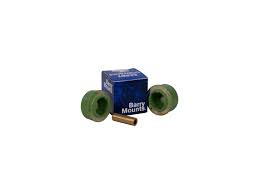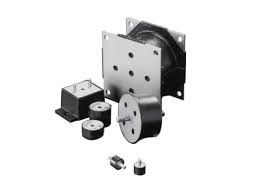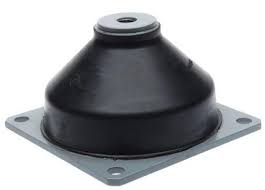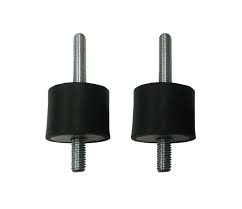Choosing the Right Equipment Vibration Isolators for Your Needs
Equipment vibration isolators are essential for reducing the impact of vibrations on machinery and equipment. These isolators play a crucial role in improving the overall performance and lifespan of the equipment. When it comes to choosing the right equipment vibration isolators for your needs, it is important to consider various factors such as the type of equipment, the level of vibration, and the specific requirements of the application. By selecting the appropriate vibration isolators, you can effectively minimize the harmful effects of vibrations and ensure smooth and efficient operation of your equipment. In this article, we will discuss the key considerations for choosing the right equipment vibration isolators to meet your specific needs.
When choosing the right equipment vibration isolators for your needs, it's important to consider factors such as the weight and size of the equipment, the frequency and amplitude of the vibrations it produces, and the environmental conditions in which it will be used. Different types of isolators, such as rubber, air, or spring isolators, may be more or less suitable depending on these factors. It's also important to consider the installation and maintenance requirements of the isolators, as well as their cost. Consulting with a professional engineer or vibration specialist can help ensure that you choose the right isolators for your specific application.
When choosing the right equipment vibration isolators for your needs, it's essential to consider various factors such as the weight and size of the equipment, the frequency and amplitude of the vibrations it produces, and the environmental conditions in which it will be used. Different types of isolators, such as rubber, air, or spring isolators, may be more or less suitable depending on these factors. It's also important to consider the installation and maintenance requirements of the isolators, as well as their cost. Consulting with a professional engineer or vibration specialist can help ensure that you choose the right isolators for your specific application.
Understanding the Importance of Equipment Vibration Isolators

When it comes to minimizing the effects of vibration in industrial settings, equipment vibration isolators play a crucial role. These specialized components are designed to absorb and dampen vibrations, helping to protect sensitive equipment and improve overall performance. Whether it's heavy machinery, precision instruments, or even HVAC systems, the use of equipment vibration isolators can make a significant difference in reducing wear and tear, increasing operational efficiency, and ensuring a safer working environment.
Equipment vibration isolators are essential for minimizing the impact of mechanical vibrations on sensitive machinery. These isolators are designed to absorb and dampen vibrations, preventing them from causing damage or negatively impacting the performance of the equipment. Vibration isolators are commonly used in a variety of industries, including automotive, aerospace, and manufacturing. They are especially important in settings where precision and stability are crucial, such as in laboratory equipment, medical devices, and electronic testing instruments. By effectively isolating vibrations, these devices can help prolong the lifespan of equipment, improve its overall performance, and reduce maintenance and repair costs. In addition, they can also contribute to a safer and more comfortable working environment for personnel by reducing noise and minimizing the transmission of vibrations through floors and structures. In summary, the importance of equipment vibration isolators cannot be overstated, as they play a critical role in safeguarding the integrity and functionality of sensitive machinery in a wide range of industrial and commercial applications.
Choosing the Right Equipment Vibration Isolators for Your Needs

Choosing the right equipment vibration isolators for your needs depends on a few key factors. First, consider the type and size of the equipment that needs vibration isolation. Ensure that the isolator can support the weight and dimensions of the equipment. Next, consider the level of vibration isolation required. Different isolators offer varying levels of isolation, so be sure to choose one that meets your specific needs. Additionally, consider the environment in which the equipment will be used. Some isolators are better suited for outdoor or harsh environments, while others are designed for indoor use. It's also important to consider the frequency and amplitude of the vibrations that need to be isolated. Some isolators are better at handling high-frequency vibrations, while others are designed for low-frequency vibrations. Finally, take into account the installation requirements and any additional features that may be necessary for your specific application. Overall, selecting the right equipment vibration isolator requires careful consideration of the equipment, environment, and vibration characteristics to ensure optimal performance and longevity.
Common Types of Equipment Vibration Isolators and Their Applications

There are several common types of equipment vibration isolators, including metal spring isolators, elastomeric isolators, and air spring isolators. Metal spring isolators are used for heavy machinery and equipment, providing high load capacity and stability. Elastomeric isolators are made of rubber or other elastomeric materials and are used for a wide range of applications, including HVAC equipment, pumps, and motors. Air spring isolators use compressed air to provide isolation and are commonly used for precision equipment and sensitive instruments. These types of isolators are used to reduce the transmission of vibration and shock from equipment to surrounding structures, minimizing noise and preventing damage to the equipment and surrounding environment. They are commonly used in industrial, commercial, and residential settings to ensure smooth operation and prolong the lifespan of equipment.
The Benefits of Using Equipment Vibration Isolators in Industrial Settings

Equipment vibration isolators are essential in industrial settings for several reasons. First, they help reduce the transmission of vibration and shock to surrounding equipment and structures, which can lead to increased equipment lifespan and reduced maintenance costs. Additionally, vibration isolators can improve the safety of the work environment by minimizing the risk of equipment failure or damage. Furthermore, using vibration isolators can enhance the performance and accuracy of sensitive equipment by minimizing the effects of external vibrations. This is particularly important in industries such as manufacturing, laboratory testing, and precision machining, where even slight vibrations can significantly impact results. In addition to these benefits, vibration isolators can also contribute to a quieter and more comfortable work environment by reducing noise and vibration levels. This can improve worker satisfaction and productivity, as well as overall workplace safety. Overall, the use of equipment vibration isolators in industrial settings can result in cost savings, improved equipment performance, and a safer and more pleasant work environment. These benefits make vibration isolators a crucial component of many industrial applications.
How to Properly Install Equipment Vibration Isolators for Maximum Effectiveness
When installing equipment vibration isolators for maximum effectiveness, it is important to first assess the specific requirements of the equipment and the environment in which it will be installed. This includes considering the weight and size of the equipment, as well as the frequency and magnitude of the vibrations it will produce. Once the specific requirements are understood, the appropriate type and size of vibration isolator can be selected. It is important to ensure that the chosen isolator is capable of supporting the weight of the equipment and providing the necessary level of isolation from vibrations. During installation, it is crucial to properly align and level the equipment to ensure that the isolators can effectively mitigate vibrations. This may require the use of shims or other leveling tools to achieve the desired position. Additionally, care should be taken to secure the equipment and isolators in place to prevent any movement during operation. This may involve using mounting brackets, bolts, or other fastening methods to ensure stability. Regular maintenance and inspection of the isolators should also be performed to ensure continued effectiveness. This may include checking for signs of wear or damage, as well as making any necessary adjustments to maintain proper isolation. By following these guidelines and considering the specific requirements of the equipment and environment, vibration isolators can be installed for maximum effectiveness in mitigating equipment vibrations.
Key Considerations When Selecting Equipment Vibration Isolators for Heavy Machinery
- Understanding the weight and size of the heavy machinery is important when selecting equipment vibration isolators. Different isolators are designed to support specific weights and sizes, so choosing the right ones is crucial. - Determining the level of vibration and frequency of the heavy machinery is also a key consideration. This will help in selecting isolators that can effectively absorb and dampen the vibrations to protect both the machinery and its surroundings. - The environment in which the heavy machinery operates should be taken into account. Factors such as temperature, moisture, and chemical exposure can impact the performance and lifespan of vibration isolators, so choosing ones that are suitable for the specific environment is essential. - Considering the cost and maintenance requirements of the vibration isolators is important for long-term budget planning. Some isolators may have a higher upfront cost but lower maintenance requirements, while others may be more affordable initially but require more frequent upkeep. - It's essential to assess the compatibility of the vibration isolators with the existing mounting points and support structure of the heavy machinery. Ensuring a proper fit and installation is crucial for the isolators to effectively dampen vibrations and provide stable support. - Lastly, considering the manufacturer's reputation and customer support is important when selecting vibration isolators. Working with a reliable and knowledgeable manufacturer can ensure that the chosen isolators meet the specific needs and requirements of the heavy machinery.
Maintaining and Servicing Your Equipment Vibration Isolators for Longevity
Maintaining and servicing your equipment vibration isolators is crucial for ensuring their longevity and optimal performance. Regular inspections and maintenance can help prevent wear and tear, reduce the risk of equipment failure, and extend the lifespan of the isolators. This can include checking for any signs of damage or deterioration, regular greasing and lubrication, and ensuring proper alignment and tension. Additionally, prompt servicing and repairs should be conducted as needed to address any issues and prevent further damage. Following the manufacturer's guidelines and recommendations for maintenance can help maximize the effectiveness and longevity of your equipment vibration isolators.
Innovations in Equipment Vibration Isolator Technology for Enhanced Performance
hvac vibration isolation
Innovations in equipment vibration isolator technology have led to enhanced performance in a variety of industries. These advancements include the development of new materials with superior damping properties, improved designs for isolator systems, and the use of advanced modeling techniques to optimize performance. These innovations have enabled equipment to operate more efficiently, reduce wear and tear, and extend the lifespan of critical components. Additionally, the latest vibration isolator technologies have helped to minimize unwanted noise and vibration, creating a safer and more comfortable working environment for operators. Overall, these advancements in vibration isolator technology have had a significant impact on the performance and reliability of equipment across a wide range of applications.
In conclusion, selecting the right equipment vibration isolators is essential in ensuring the smooth operation and longevity of your machinery. By considering the specific requirements of your equipment, the environmental factors, and the type of vibration isolation needed, you can choose the most suitable isolators for your needs. With the right equipment vibration isolators, you can minimize the impact of vibration on your machinery, improve performance, and reduce maintenance costs in the long run. Therefore, it's crucial to invest in high-quality equipment vibration isolators to protect your valuable equipment and optimize its functionality.<
small vibration isolation mounts/h4>
See also
https://www.industrialnoisecontrol.com/vibration-isolation.htm https://www.smcworld.com/products/en/anti-vibration/